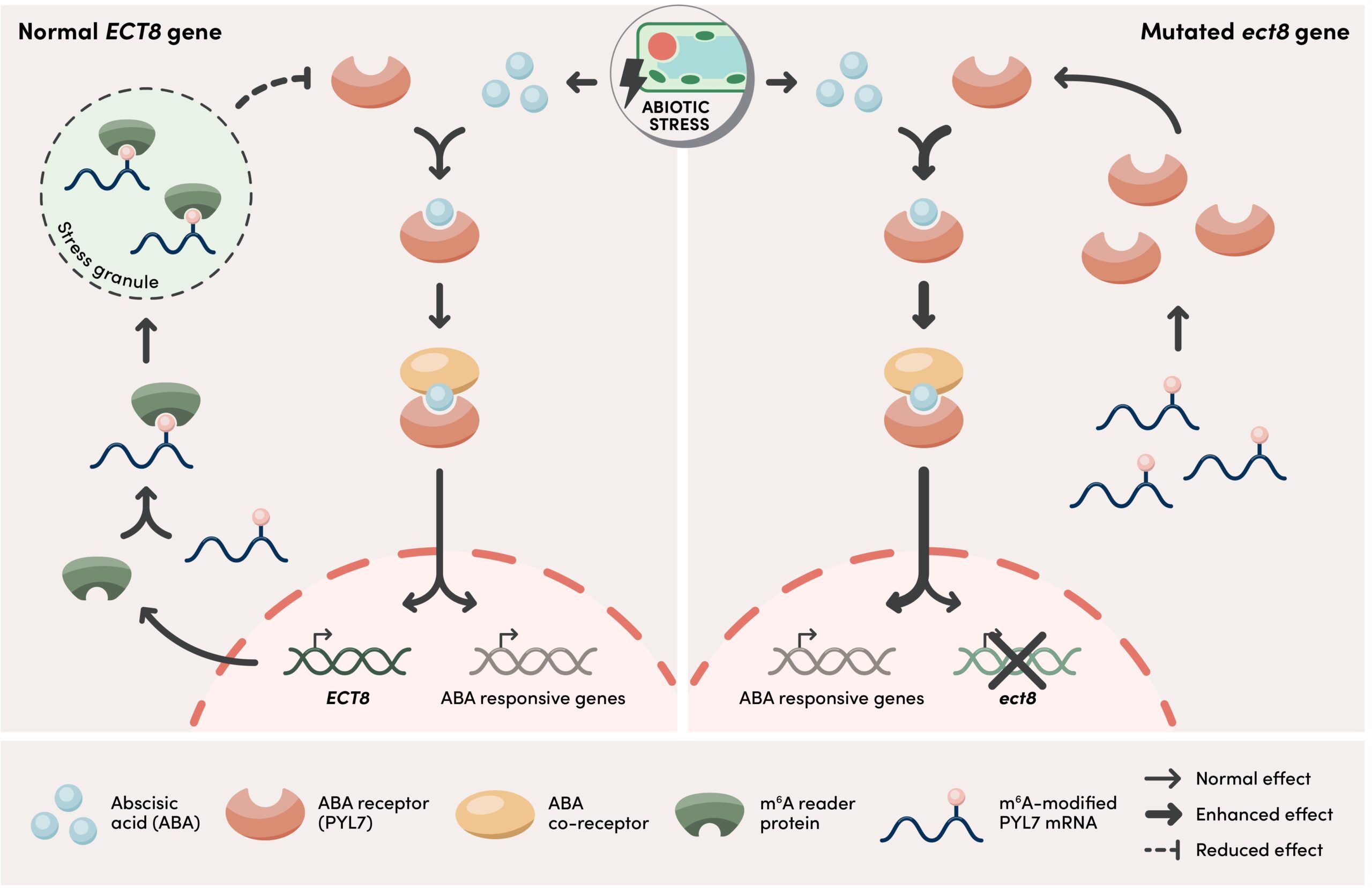Fine-tuning plant responses to stress
April 12, 2024Plants, like all living organisms, face constant challenges from the environment. In order to thrive and survive, plants have developed intricate mechanisms that allow them to respond to various stressors, including environmental ones such as drought, high salinity, and cold temperatures.
One key player in the plant stress response is the hormone abscisic acid (ABA), which is produced in response to environmental stress. ABA helps plants adapt to adverse conditions by regulating physiological processes such as stomatal closure and seed dormancy.
While ABA is essential for plant survival, a hypersensitive response to this hormone can have detrimental effects on plant development including stunted growth and reduced yield. With extreme weather events and climate change threatening agriculture and biodiversity around the world, it is becoming increasingly important to understand plant stress responses, including the regulation of ABA signalling.
To this end, Professor YU Hao and his team from NUS Biological Sciences, together with their collaborator, Dr Lisha SHEN’s team from Temasek Life Sciences Laboratory, delved into the genetic pathways that regulate ABA signalling in the model plant Arabidopsis. In their work, the team identified a novel ABA regulation mechanism involving a specific RNA modification known as N6‑methyladenosine (m6A) and its reader protein ECT8, which controls the fate of PYL7, a gene that encodes an ABA receptor, and thereby regulates ABA sensing within plant cells. This work was published in Nature Plants.
In this study, it was reported that ABA exposure triggers an increase in ECT8 expression, leading to the formation of stress granules in the plant cells. At present, not much is known about stress granules except that they store RNA molecules under stress conditions. Temporary storage of the RNA molecules plays a role in mediating the levels of resulting proteins in response to various stresses.
In Prof Yu’s experiments, it was shown that following ABA treatment, ECT8 facilitated the formation of droplet-like structures in the cell’s cytoplasm. These structures, often referred to as liquid-liquid phase-separated (LLPS) condensates, are the building blocks of stress granules.
Further investigations revealed that ECT8 selectively recruits certain m6A-modified RNA transcripts, including PYL7 into stress granules. This process partially depletes PYL7 mRNA in the cytoplasm, thereby reducing PYL7 protein levels and regulating ABA signalling. The process prevents hypersensitive reactions to the environmental stresses.
The team also showed that plants lacking functional ECT8 were unable to sequester PLY7 transcripts in stress granules even under the same ABA conditions. This saw more PYL7 transcripts translated into protein, leading to an overaccumulation of PYL7 and hypersensitive plant behaviours to stresses such as drought resistance.
To understand how ECT8 accomplishes this, they used advanced sequencing techniques to analyse the m6A modification patterns of mRNA molecules within stress granules. m6A is a chemical modification that occurs on RNA molecules in eukaryotic cells, and plays a crucial role in regulating various cellular processes, including cell differentiation, embryonic development, and stress responses. They found that ECT8 primarily recruits m6A-modified mRNAs that are involved in stress responses, metabolism, and protein synthesis.
Overall, this study sheds light on a novel regulatory paradigm in which m6A RNA modification plays a crucial role in enabling feedback regulation of ABA perception and signalling to prevent plant cells from overreacting to specific environmental stresses. It also demonstrated, for the first time, the underlying link between RNA modification, stress granule formation, and systemic ABA signalling in plants.
By studying the stress response of Arabidopsis, which is closely related to significant crop plants like choy sum, cabbage and broccoli, Prof Yu hopes the findings will contribute to the development of stress-tolerant crops with traits such as drought-resistance, in the future.

Reference
Wu X; Su T; Zhang S; Zhang Y; Wong CE; Ma J; Shao Y; Hua C; Shen L*; Yu H*, “N6-methyladenosine-mediated feedback regulation of abscisic acid perception via phase-separated ECT8 condensates in Arabidopsis” Nature Plants volume: 10 pages: 469 – 482 Published: 2024.
Source: NUS Office of the Deputy President (Research and Technology)


